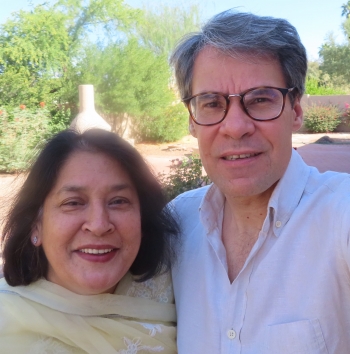The Center of Muslim Experience in the United States draws on ASU’s charter of inclusivity, public values and community impact
By Andrea Chatwood
November/December
The Center of Muslim Experience in the United States (CME-US) at Arizona State University (ASU) reflects a pioneering endeavor to advance research and deepen public knowledge on the understudied history of Muslims in the U.S. and their many contributions to American society and culture.
With a student-centered approach, CME-US will facilitate belonging for Muslim students at ASU and work to build mutually beneficial partnerships between Muslim communities across the country and the university. The center, which will be housed in the School of Historical, Philosophical and Religious Studies, is part of the humanities division in The College of Liberal Arts and Sciences.
“In creating the vision of CME-US, we were inspired by ASU’s mission of being ‘measured not by whom we exclude, but rather by whom we include and how they succeed,’ and by its commitment to research defined by public value,” Chad Haines (associate professor, religious studies, the School of Historical, Philosophical and Religious Studies; co-director, CME-US) told ASU News on August 29. “These values connect with Islamic ethics of acceptance and working for the social good that is evident in Muslim American communities and their experiences, providing CME-US a unique opportunity to bridge diverse worlds and advance ASU’s mission.”
During the first three years, Haines and co-director Yasmin Saikia (Hardt-Nickachos Chair in Peace Studies, the Center for the Study of Religion and Conflict; professor of history, the School of Historical, Philosophical and Religious Studies) will work to develop a faculty and student-led academic project and write a report on “Global Phoenix and Muslim Lives and Contributions.” The study will document the long history of Muslims in the Valley [of the Sun – a moniker earned for its year-round sun and warm temperatures] and their richly diverse cultures, along with their many contributions to making Phoenix a uniquely global city.
In addition, they plan to conduct a “Connections” seminar bringing together faculty, graduate students and journalists to work on writing about Muslims from a new perspective for wider public dissemination. This work will lead to the creation of a digital virtual museum on Muslim experiences in the U.S.
“The Muslim contribution to world history and culture would be difficult to overstate — and the Muslim experience in the United States has helped to shape the nation,” says Jeffrey Cohen, dean of humanities. “ASU has a population of over 8,000 Muslim faculty, staff and students. They deserve to have their stories, histories and rich cultures valued and shared. Under the leadership of Dr. Haines and Dr. Saikia, CME-US will change the narrative, both locally and nationally, to ensure that the Muslim experience in the U.S. receives the attention it deserves.”

“By creating a space for students to share their own stories, both Muslim and non-Muslim students will benefit from knowing one another and learning to appreciate that socio-cultural differences can benefit improved community-building locally,” Haines states.
The CME-US will also highlight the diversity and creativity of Muslim Americans and their contributions to American culture by organizing events and performances. The center plans to host poetry readings and musical performances, curate exhibits documenting Muslim lives and invite Muslim stand-up comics, actors, inspirational speakers and writers to ASU for public events.
The husband-and-wife duo of Haines and Saikia have co-edited three books: “Women and Peace in the Islamic World” (2014), “People’s Peace” (2019) and “On Othering” (forthcoming).
“The focus of our books is on sustainable peace forged by everyday lived ethics between people rather than the Band-Aid solutions of conflict management by international organizations that dominate the field of peace studies. We decided to focus our work on the most misrepresented group in the United States — the Muslims — and tell their story from their perspective to transform the relationship between Muslims and the wider American public,” Saikia says.
She adds, “at the heart of the many misconceptions of Islam are Muslim women. This needs addressing and discussing so we can transform the skewed image and show the reality of how Muslim women in America are contributing to multiple facets of American community life and well-being.”
The center will develop workshops, public lectures and community outreach to schools and local organizations to educate and advance scholarship of ASU faculty and graduate students on Muslim American women.
Combining ASU’s power as the country’s largest university, the support of ASU’s administration and the state’s vibrant and fastest-growing local Muslim community, Saikia and Haines look forward to the work ahead.
Their aim is to show how Muslim experiences can help make the U.S. a more dynamic and inclusive country.
Andrea Chatwood is a communications specialist at The College of Liberal Arts and Sciences.
[Editor’s note: Edited and published with permission. See ASU News, Aug. 29, 2022]
Tell us what you thought by joining our Facebook community. You can also send comments and story pitches to horizons@isna.net. Islamic Horizons does not publish unsolicited material.
